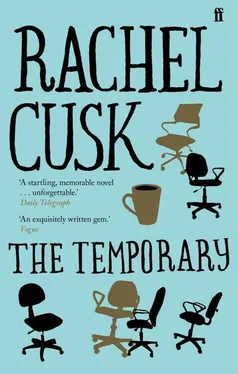Francine was surprised to feel the prickle of tears at her eyes, and having no better weapon to hand, she seized on them, forcing them out with sobs loud enough to inform Ralph on the other end of her distress. Janice looked up, suddenly alert, her face a picture of outrage. She made slamming signals with her hand which suggested that Francine should put the phone down.
‘Francine?’ said Ralph nervously. ‘Francine, I’m sorry. Please don’t cry. I’m sorry about that. I’m just tired, that’s all.’
‘That’s OK,’ said Francine, sniffing softly.
Janice shook her head dramatically.
‘Come round on Thursday. Can you do that? We’ll have a good talk. Everything will be fine, I promise. Will you come?’
‘I–I’m not sure,’ she demurred. ‘You frightened me.’
‘Oh, for God’s sake—’
She could hear impatience rising again in his voice, and knew that an aspect of surrender was her only refuge.
‘What time shall I come?’ she said weakly.
Janice put a despairing hand to her forehead.
‘Whenever you like. No, come at about seven. I won’t be able to get away much before that.’ He paused. ‘I’ll see you, then.’
‘See you,’ said Francine.
Ralph sat at his desk and looked out of the window at the sky, where swift, muscled clouds were chasing the sun, intermittently cloaking the nervous glare of the Holloway Road with their grey pallor. He was finding it difficult to work, although only a few minutes ago Neil had visited his desk, straightening his sportive mustard-yellow tie to signal the imminent assertion of his authority.
‘Watch at the mender’s?’ he had said jovially, gripping the back of Ralph’s chair with his large hands and leaning close to his ear.
‘I beg your pardon?’
He had shrunk from the sudden assault of Neil’s breath, which was warm and bitter with coffee. His physical proximity, only an hour or so after Ralph had reluctantly emerged from the clean, tight bud of sleep, was ripe with odours. Seeing Ralph flinch, Neil drew back stiffly.
‘You’re late again, mate,’ he said, cold with offence. ‘We start business here at nine o’clock sharp and not even flipping royalty comes in at half-past.’
‘Sorry,’ said Ralph. Roz was staring at him, her face empty as a plate. ‘I got stuck in traffic. I’ll leave home earlier tomorrow.’
‘If you would,’ said Neil. He observed a calculated pause before delivering his final blow. ‘Pull your finger out, mate. All right?’
Ralph didn’t reply and Neil walked back to his desk, his retreating shoulders awkward with importance. Roz continued to stare. Ralph could feel her drifting at the periphery of his vision like a moon.
‘I went to my grandad’s last night,’ she said suddenly.
He looked at her in astonishment. His life seemed to have taken on an atmosphere of unreality in which he had been rendered powerless.
‘Really?’ he said.
‘We sorted out his attic.’ She nodded. ‘It was a right mess.’
‘He must have been pleased,’ said Ralph. He held her gaze for a minute longer and then directed his eyes deliberately back to his work.
‘He’s dead,’ said Roz.
‘Oh, I’m sorry.’
‘I saved something for you. Do you want it?’
Ralph felt hot with desperation. His throat was tight. He stared at her helplessly.
‘What is it?’ he said.
‘Magazines,’ replied Roz. ‘I got a whole box full.’
‘What sort of magazines?’ He tried to sound interested and alert, but thoughts of a fingered pile of obscenities, rancid with second-hand loneliness, made his voice unsteady.
‘Cars. Do you want them?’
‘Oh — OK.’ Relief made him biddable. ‘Thanks very much, Roz.’
‘I’ll bring them in tomorrow,’ she said.
The desire to avoid any further communications on the subject infused Ralph with application. He bent over his work, willing it to occupy him, as hungry for its oblivion as an insomniac begging for sleep. Gradually he was absorbed, and by lunchtime he had completed his whole day’s ration of copy. He put it on Neil’s desk.
‘I’ve finished,’ he said ridiculously.
Neil looked at him and suddenly emitted a high-pitched laugh.
‘Got your knickers in a twist, did I?’ he said. ‘It’s that posh school you went to, old boy. Next time I’ll give you a good caning and me and Roz can take the day off. Ha, ha!’ He bent over his desk, convulsed with humour.
Ralph left the office to go shopping. Francine was coming that night, and the thought of buying delicacies for her made him feel less guilty for the fact that he recoiled from the prospect of her arrival. He imagined arranging things on plates, sentimental offerings behind which he could disguise himself and skirt the void of his affection for her, frightened of what might happen if he tripped and fell into it. It had been good spending a night away from her. He had slept deeply, marinated for hours in the dreamless essence of himself, and when he woke it had been just as he had feared: incandescent with autonomy, he couldn’t even stand the thought of her. He had tried to warn her of that on the phone, the fragility of their concord, the risk she ran by taking even a small step back that he would see her too clearly. Sometimes he felt that it would require only a breath to extinguish his guttering feelings for her completely. As he joined the shabby flow of people drifting along the littered pavement outside the building, he grew fascinated by the sudden sense of his own hollowness, his transparency; so much so that within minutes he had collided painfully with a man coming the other way. Stammering his apologies, he felt the blood burn again in his skin and he walked on towards the shops, clumsy now with physical solidity as an ache glowed in his shoulder.
He supposed it didn’t matter what he felt, in any case. He had recently begun to think, as he had done when he was younger, that unhappiness could be conquered merely by the denial of its rights, the dissolution of its property: it had no claims outside those which he permitted it, manifested itself in no physical way, and simply by declaring that the part of himself in which it lived did not exist, he felt sure he could actually make it disappear. He had always drawn a strange comfort from thinking that it didn’t really matter what happened to him. It was interesting to see how just the idea of it could cancel out fear. The problem with fear, though, he realized, was that it was hard to kill at the root. It had ways of springing again to life just as one turned one’s back on its slain form, breeding at the blink of an eye into multitudes. He felt it now, gnawing at the membrane of his sleep, penetrating the glassy, muted morning. Thinking of Francine, his skin suddenly prickled as if it were about to burst into boils.
He reached the bank and anchored himself at the end of a long queue. Ahead of him people stood mired in different postures, an alphabet of inertia. Watching them, Ralph considered the fact that in each of them a torrent of consciousness bubbled or raged, or was perhaps still, and for a while the bank was so quiet that he imagined he could hear their thoughts.
‘I keep telling them, but no one listens to me, of course,’ said a woman loudly in front of him. She was well spoken and he could see the shiny black haunch of a handbag protruding from beneath her elbow. The back of her head was level with Ralph’s eyes, and her chalky scalp was visible through the erosion of brittle hair. ‘It’s so easy, isn’t it, if you think about it?’
There was a brief silence and Ralph suddenly realized that the woman was alone. Several people in the queue turned round and then quickly looked away, their faces thick with embarrassment.
Читать дальше












